
Flying High Again—March 2018, Canadian Packaging
By Andrew Joseph, Features Editor; Photos by Johanne Rene
Automation Coding & Labeling Film Fraser Valley Specialty Poultry MultiFresh Multivac Canada R 175 MF thermoformer slideshow Twin Maple Group of CompaniesB.C. poultry farmer and processor goes through the highs and lows to once again emerge as a Canadian success story
Despite appearances as a plucky poultry business, one B.C. farm and processor with a convoluted history that stretches back nearly a century, has not only survived the ups and downs of economy and nature, but has maintained a never-say-quit attitude throughout it all that has seen it become a good-ole Canadian success story.
Fraser Valley Specialty Poultry of Chilliwack, B.C. is part of the Twin Maple Group of Companies operated by the Falk family, whose origins involved leaving the U.S.S.R. during the early part of the 20th century to avoid religious persecution.
The five-generation family farm is nowadays owned by Ken and Iris Falk and Ron and Jan Born, and provides poultry mainly for the large Asian ethnic population in the greater Vancouver area, and for a number of white-table-cloth restaurants throughout the region.
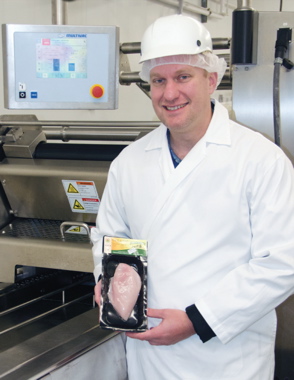
Fraser Valley Specialty Poultry general manager Joe Falk holds a pack of skinless organic chicken breast sealed via a Multivac R 175 MF (MultiFresh) thermoformer the company purchased for its 10,000-square-foot facility in Chilliwack, B.C.
“If you have ever visited Vancouver’s Chinatown and seen those delectable barbecued ducks displayed in their storefront windows,” general manager Joe Falk, son to Iris and Ken, told Canadian Packaging, “you have seen our products.”
Fraser Valley Specialty Poultry currently annually processes some 800,000 ducks; 1.35 million chickens for the Asian markets; 2,000 turkeys; 25,000 geese; 60,000 squab; and 120,000 organic chickens.
“We are the leader of specialty poultry products, specifically on ducks, holding an estimated 75 percent share in B.C.,” relates Falk. “As well, we are the largest single grower in Canada of Asian-style Taiwanese chicken.”
Falk notes that the company’s processing facility is provincially licensed, but has a close relationship with a Federally-registered establishment in Abbotsford that processes its products that move it out of the province.
The Falk family currently owns and operates breeding and growing poultry farms and distribution facility, and a 10,000-square-foot processing plant, has 150 employees and 25 contracted family farms that supply them with product—a stark contrast to the Falk family that had to sell all of their possessions before arriving in Canada in 1926 as part of the large exodus of Mennonite Colonies from the Soviet Union.
Led by Henry and Margaret Falk, the family arrived in Halifax, before quickly departing on another epic journey across the country for Abbotsford, B.C. to begin anew as Canadian farmers.
While the family had previously been involved in grain farming in the Ukraine and Siberia, they decided to try their hand at dairy farming and broiler chicken farming on land the family still owns. A hard worker and looking for ways to supplement his small farm operations,
Henry started his own construction company and a lumberyard alongside the farming operations.
Eldest son Abe eventually grew to take the lead in the businesses, growing each exponentially, as he and his brothers then became involved in raspberry farming quickly becoming the largest raspberry farmer in North America becoming the first farm to test berry harvesting machines.
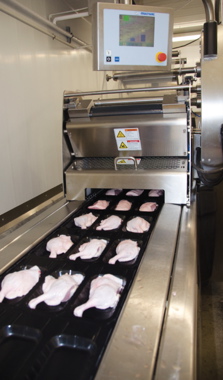
Duck meat is placed manually into trays entering the Multivac R 175 MF thermoformer, capable of sealing in the meat at a rate of six to eight cycles per minute.
In the 1960s, the family purchased land in the Peace region of Northern B.C. to farm grain, hay, grass seeds and hogs, continuing this side of the business until the late 1980s.
It was in 1973 that Falk Brothers Industries was born—a construction company that became a million-dollar outfit involved in the agriculture, commercial and industrial sectors.
Not ever content to have all its eggs in one basket, the family purchased a layer chicken farm in 1974.
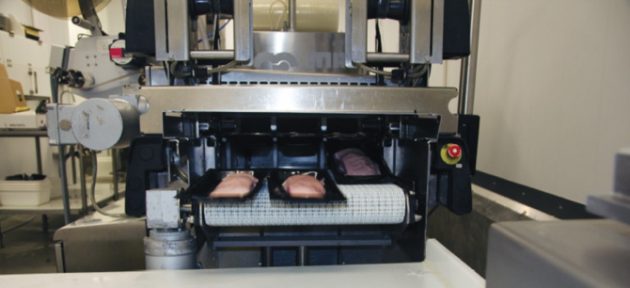
Exiting the Multivac R 175 MF thermoformer, each of the duck products are vacuum skin sealed lending the product a superb shelf presence at the retail level.
“On our home farm, there were two small maple trees, and my grandparents parents, Abe and Jessie decided to name their new farm after these maple trees,” explains Falk. “And that’s how Twin Maple Produce Ltd. was born.”
With all its business ventures seemingly doing well, the family business suffered a bankruptcy in 1985 brought on by massive interest rate hikes, low hog prices, and a number of businesses defaulting on payments owed for construction projects.
But, that never-say-quit attitude that their parents espoused after leaving Europe was brought to the forefront again, this time at least being able to hold onto their layer farming operation thanks to succession planning prior to the financial plunge.
At this time Ken Falk, son to Abe and Jessie, took on the leadership roll of the family business with Ken, brother-in-law Ron, and several cousins banding together to form Cousins Construction.
Abe, while still only in his late 40s, was looking for new opportunities and started up Twin Maple Marketing, which continues to this day to distribute various building products such as Reflectix insulation and wood floor vents.
Along with the construction and distribution businesses, the family continued with farming the layer chickens.
“In 1988, one of the customers for the construction company decided he wanted to sell his business—Fraser Valley Duck & Goose, started by Peter Zilian in the early 1970s,” explains Falk.
The business was primarily a duck growing and processing operation serving the local BC Asian population as the primary fresh duck supplier, and was purchased and is now run by Twin Maple Produce.
“I became engaged in the operation of Fraser Valley,” explains Falk. “I worked my way from the ground on up, getting practical experience in all departments: hatchery; breeder farm; growing farm; processing plant; distribution; and sales and marketing, building the business into a large force within Canada.”
And then disaster struck in the form of the 2004 Avian Influenza, essentially causing the elimination of the valuable and unique genetic strain of bird that had been initially developed by Zilian.
While Fraser Valley Duck and Goose struggled over the next five years, other competitors overtook the company’s markets.
“But our family isn’t one to throw in the towel in the face of adversity,” says Falk. “As such, we decided it would be prudent to diversify our product lines to reduce risk and serve the market with a full line of specialty poultry products.”
Fraser Valley Duck and Goose began to grow some Asian style chicken in 2002.
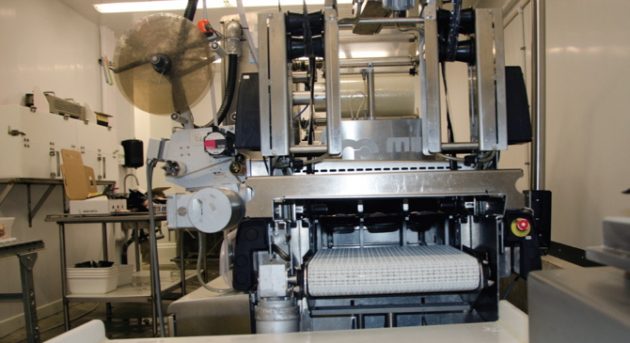
The rear-view of Multivac R 175 MF MultiFresh thermoformer that can not only provide vacuum skin packaging, it can alternately be used for MAP (Modified Atmosphere Packaging).
Falk says that while the company’s initial numbers were small at roughly 500 birds per week, between 2005 and 2010, the growth was massive.
Fraser Valley Duck and Goose purchased smaller poultry farms to better in crease its provincial mandated quota, and worked closely with the British Columbia Chicken Marketing Board through this regulation as the demand for the poultry product exceeded the supply.
“During this time period, the ownership decided that the current name Fraser Valley Duck and Goose was no longer representative of the farm,” recalls Falk, explaining that they decided to change the name to Fraser Valley Specialty Poultry.
“We now work closely with 25 family farms supplying quality specialty poultry products, Asian Taiwan chicken, squab, turkey, Organic chicken, ducks and geese.”
Today Fraser Valley Specialty Poultry’s products can be found throughout B.C., though its Asian chicken product line is available across Canada and throughout the West Coast of the U.S.
As Falk says “Through all the difficult times and good, it’s just like our company’s vision states: Our family loves to farm and produce good food.”
Falk notes that over the past few years, the demand for retail packaged poultry parts and pieces has been on the rise.
“Primarily, the company had been supplying whole birds to the market place to this point,” says Falk, adding that as a means to provide a quality package to keep up with its quality poultry meats, the company began exploring various types of packaging machines, until being exposed to Multifresh and its skin pack European technology.
The MultiFresh packaging utilizes the innovative MultiFresh technology from Multivac, a leading global provider of packaging solutions for food, life science and healthcare products as well as industrial items. Headquartered in Germany, the company has offices across the lanet.
The MultiFresh packaging consists of a rigid tray and a flexible upper web, which surrounds the product free of tension, and is entirely sealed by the lower web.
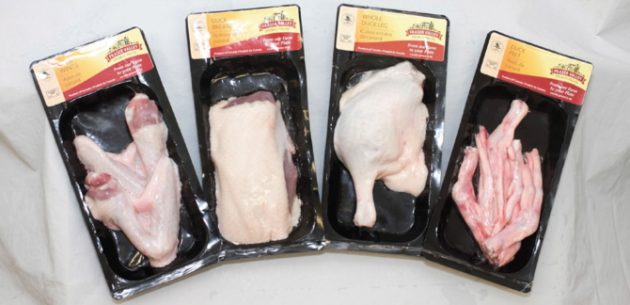
Examples of the wonderful vacuum skin packaging produced by the Multivac R 175 MF thermoformer owned by Fraser Valley Specialty Poultry in Chilliwack, BC. The clean look of the packaging has garnered rave reviews from consumers.
Installed at Fraser Valley Specialty Poultry in June of 2017, the Multivac R 175 MF (MultiFresh) thermoformer and Multivac materials produces the exquisite MultiFresh vacuum skin packaging that Falk says has helped bring its products to a new level of eye appeal on the retail shelf.
“The film is like a second skin for the product,” observes Falk. “The product stands out from the package and presents extremely well.
“Consumers can visually see the product better this way when compared to other styles of packaging use,” he continues.
While the R 175 MF can be used for vacuum skin, it can optionally be used for MAP (modified atmosphere packaging) and vacuum packaging.
Multivac says the MultiFresh aspect is mainly utilized by packers involved in high-end product in the meat, and meat product, fish and seafood, poultry, convenience food, cheese, and pastry segments.
The MultiFresh packaging is rather robust, as there is virtually no way anyone can poke a finger through this skin pack.
“Light handy, and easy to store, our MultiFresh products are a very convenient package for display, and for storage in the refrigerator,” comments Falk. “MultiFresh is the new frontier of meat packaging, and we are proud to offer this state-of-the-art packaging technology to our valued Fraser Valley Specialty Poultry customers.”
The R 175 MF at Fraser Valley runs up to between six to eight cycles per minute depending on the vario used. For the mold and vario size they are currently using, it can do 18 packs per minute—three trays per cycle.
Falk is certainly impressed with the Multivac R 175 MF thermoformer. “It has increased our efficiency,” he notes. “The speed of the machine is far more efficient than what we were utilizing previously.
“We manually load each pocket by hand, but once that is achieved, the easy-to-operate machine takes over and has helped us in crease our overall food safety,” Falk reveals, adding that along with the superior retail presentation of the product, he is also equally proud of the increase in shelf life for fresh product.
Despite the rave reviews proffered by Falk, he says that like with anything new, the initial response wasn’t always positive.
“Some of our retailers rebuffed the new packaging option we provided them,” says Falk, “Either they didn’t want something new on their shelf, were afraid of change or simply didn’t need the hassle.
“But we were ready to educate the retailer who in turn could educate the consumer so that each could better understand the benefits of the package,” retorts Falk.
“Every week as the demand increases and as our volumes rose, more and more retailers came on board with the skin pack.”
While Fraser Valley Specialty Poultry has 450 SKUs (stock-keeping units) and serves the retail, wholesale and foodservice sectors with many various types of packaging as required by the markets, it also has two of its own brands: Fraser Valley which serves the Asian markets; and Yarrow Meadow, a relatively new brand that that has become well known in high-end restaurants and wineries.
“About 99 percent of what we process is for our brands, with chicken representing about 50 percent of our business and duck 35 percent,” Falk recalls.
“We have developed several innovative types of product that have become very popular,” explains Falk, “specifically duck sausage, duck pepperoni and smoked duck breast—we can’t keep these products on the shelves.”
While those duck products are currently under its Fraser Valley brand, the company’s Yarrow Meadow brand which includes the organic chicken and duck parts, continues to sell well, available at Choices Markets, Fraser Valley Meats, Two Rivers Meats, Fraser Valley Farm store in Yarrow, as well as through many other retailers throughout the greater Vancouver area.
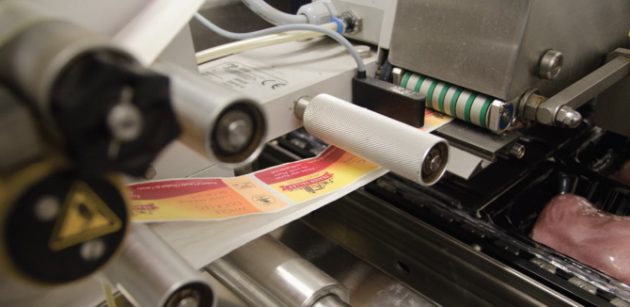
Inline on the M 175 MF thermoformer from Multivac, a close-up view of labels being applied to the top of the tray before the package sealing process is actuated to provide a MultiFresh skin pack look.
POULTRY IN MOTION
After the poultry arrives at the facility in trailers, they are manually off-loaded and hung on a line to be humanely slaughtered.
Sent through a bleed tunnel, a scald tank, feather plucking, the waterfowl—not the chicken, turkey or squab—next travel through a hot wax tank, are then wax chilled, followed by a wax stripping to ensure removal of the pin feathers.
Next comes the evisceration room where the oil gland, feet and viscera are removed (the head and or neck may also be removed, depending on product type and SKU) and the bird is prepped for inspection where any bird deemed unfit for consumption is condemned by the government inspector.
Falk says the birds are then sorted by size, with some going for whole bird packing, and others for the cut up line.
“The birds are then placed into tanks for chilling,” Falk says, noting that chilling is a combination of water, ice and air. “It can take upwards of 30 minutes for the birds to be properly chilled to a temperature of less than 4C before we send them to be cut up or packaged.”
After packing, they are sized and placed into large corrugated cases that are then rolled along a conveyor to a scale. A scale operator enters the SKU, and then a barcoded label is printed and applied to each side of the case.
“We have developed our own software for handling our SKUs, and our own barcoding system that we fully integrated into the ERP (enterprise resource planning) system we use called Syspro,” Falk explains. “Traceability is crucial to our food safety program.”
After palletizing, it is placed in refrigeration, or for freezing, or to a waiting truck for delivery to customers.
He says they are quite interested in growing the Yarrow Meadow brand for retail distribution, which is why it purchased the Multivac packaging machine.
“Being a multi-species plant is difficult as far as automation is concerned, as there is no equipment one could purchase that could handle all of the various species that go through the plant,” Falk acknowledges, explaining why much of its line and processes are manual.
“However, we have put in the Multivac skin pack packaging line, which we have found to be an excellent example of automation that works equally well for both chicken and duck parts,” extols Falk.
Next up for the poultry company is the automation of the front end of the processing line by adding a new crate handling system that the chickens and ducks arrive in. The new system will automatically unload the crates onto a conveyor system that Falk says will improve animal
welfare as well as create a better workflow for facility staff.
“We are constantly trying to evaluate and deliver to the market a better product,” Falk explains.
“Claims are becoming very important,” he continues, “things such as RWA (raised without antibiotics), GMO (genetically modified organism), organic, animal welfare and more—and still we have to maintain a price point that is realistic. It’s a constant challenge.”
Summing up, Falk notes: “We are going to be launching a new RWA chicken program in May of 2018, which will join our duck and organic chicken programs.
“While we have learned in this family to never count one’s chickens before they are hatched, we believe that the steps we have taken to diversify along with creating a superior taste experience for consumers, will have Fraser Valley Specialty Poultry continue its upward growth.”
Advertisement

